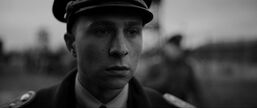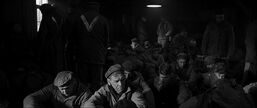The World War II-themed poster and the title of "The Fake Captain" make people mistakenly think that this is a black humor type movie, but after watching the whole film and understanding the story behind it, I found that the film is only bottomless black, and a little humor is all about it. Can't get it up. In fact, the story of The Imposter Captain is even a little disturbing. This is an absurd and dark anti-war film. The film is set against the backdrop of Nazi Germany, which is about to fall. It discusses the reshaping of personality in an extreme environment and the alienation of human nature in totalitarianism. The depth of reflection can even be compared to "The Tide".
In the last two weeks of World War II, the totalitarian Nazi Germany was about to collapse, the front line continued to collapse, and the rear was plunged into chaos. A large number of deserters not only brought defeatist sentiment to the rear, but also led to the collapse of social security in the German rear. Bad. This is the special era background in which the story takes place, a totalitarian state in extreme times. The state machine and ordinary people, who have lost their direction and hope, have fallen into a feeling of defeatism at a loss. Troubled times create heroes, but also demons. A 19-year-old deserter with acting talent picked up a brand new captain's uniform. With his excellent performance ability, the fake captain Hu Jia Hu Wei gathered other deserters who were scattered to form a so-called "special task team", all the way. Do whatever you want in the rear of the falling Nazis, and use the Führer as a leader to control the power of life and death. This is where the absurd, dark story begins.
At the end of the war, the state machine that has lost its direction and hope is at a loss, but under the totalitarian system, a primitive driving force can drive the dying machine, and this primitive driving force is absolute authority. In Nazi Germany, the absolute authority is Hitler and the totalitarian system itself, so in extreme times, a skin that represents power and a behavior that absolutely pursues totalitarianism can easily erect a banner that symbolizes the name of the devil . And out of inertia and servility, those ordinary people under the totalitarian system crawl under the feet of the devil without thinking, and the influence of their environment on personal behavior is far beyond our imagination. Due to the dehumanization of institutionalization, the human nature of ordinary people under totalitarianism has become a nihilistic existence. Those ordinary people and vassals are only tools for the totalitarians, and their human side has been institutionalized to obliterate them. Totalitarianism induces, utilizes and strengthens the darkness and cruelty in human nature, and the darkness of human nature is extremely magnified in the extreme ruling order.
The young deserters in the film are well versed in officialdom, and only through a Nazi uniform that symbolizes authoritarianism and their excellent acting talent, they easily gain the control of a totalitarian organization. The absence of "God" (Hitler) makes the illusion of human subjectivity manifest in totalitarianism as an extreme expansion. The young deserter could have chosen the good, but he did not escape totalitarianism. When you stare into the abyss, the abyss is also staring at you. Under the extreme environment at the end of World War II, totalitarian organizations have developed to an uncontrollable level, and the organizers themselves are actually kidnapped by totalitarianism. In the social environment where the evil of totalitarianism is rampant, the dehumanization is institutionalized, and people are placed in the choice of either being harmed or harming others, but who will choose to be harmed by themselves? The young deserter who has been immersed in his eyes and ears chose to degenerate, remove his humanity from the system, and integrate into this demonic system perfectly and smoothly, and his personality is also reshaped in the virtual symbol of totalitarianism (Nazi uniform). .
The fake captain chose to degenerate, but what is more ironic is a large group of ordinary people who pretend to be confused. Human beings have the instinct to obey and worship authority, while the soldiers in the movie obey more thoroughly. What they obey is only the symbol of authority. An accessory product: Nazi uniforms, for which he easily gave up his "human" attributes. These people had the opportunity to overthrow the false authority: the ordinary soldiers in the film who discovered the imitation through the length of their uniforms chose to remain silent after a series of horrific massacres. Those who remain silent when they understand the darkness of human nature are eventually swallowed up by this dark silence and become an inseparable part of totalitarianism. This is the most terrifying chapter of the film. As stated in The Origins of Totalitarianism: "The real terror of totalitarianism is that it rules over a population of utterly silent inhabitants." This is the evil of banality.
It is extremely difficult to discuss totalitarianism without human nature. Starting from the essence of human nature, it is easy to find that totalitarianism is actually a part of the essence of human nature. The essence of totalitarianism is alienated idealism, which is a part of human nature. When totalitarianism controls the state apparatus, it controls the ideology of the people and creates the "ideal society" imagined by totalitarians in the form of the state's will. But this ultimate "ideal society" comes at the expense of individual will. In order to achieve the ideal goal, the totalitarian can sacrifice everything. In such a huge organization, human nature has been completely wiped out, people have become tools, and the evil of totalitarianism and the evil of mediocrity are infinitely magnified in the ruins of lost humanity.
The solemnity brought by the black and white tones and the sense of tranquility created by the language of the lens make the viewer become another part of the silence. The carnival, trial, and walk on the dry bones at the end drag the story into a deeper blackness, and the absurdity of "The Fake Captain" makes this blackness magical and unreal. However, this is actually adapted from real historical facts. This gap between reality and reality can only be described as horror. Under the totalitarian system, the changes in human nature and the reshaping of personalities are far more absurd and dark than dramatic stories. I have to say that this is very disturbing, because all this is really not far away from us.
View more about The Captain reviews











